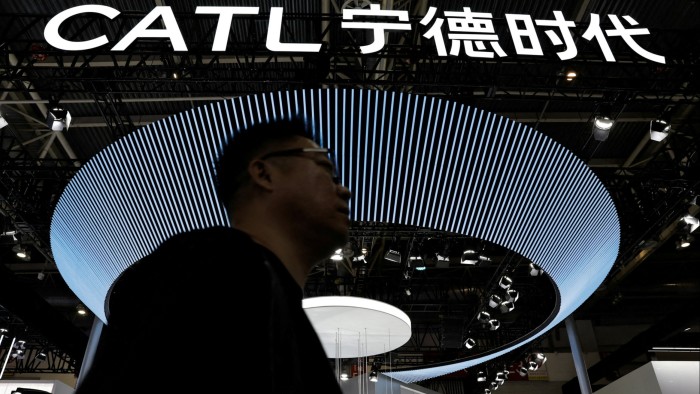Environmental, social and governance funds run by global managers have at least $1.4bn allocated to 14 electric vehicle and solar companies linked to forced labour in Xinjiang, according to an analysis by Ignites Asia.
Amid growing scrutiny of Chinese and foreign firms operating in the region, the findings shed light on risks for fund firms that fail or are unable to conduct thorough due diligence on Chinese supply chains of investee companies, experts say.
Most of this sustainable investment, totalling US$1.1bn, has been invested in Contemporary Amperex Technology, the world’s biggest EV and energy storage battery manufacturer, according to Morningstar data analysed by Ignites Asia.
CATL’s operations have increasingly drawn the attention of politicians and academics in recent years.
In June, the Republican-led US House Select Committee on the Chinese Communist party said that it had uncovered new evidence linking CATL to CCP state-sponsored forced labour and human rights abuses against the Xinjiang minority.
This followed a report by researchers at the Helena Kennedy Center for International Justice at Sheffield Hallam University in the UK, who said that CATL’s expansion into the Xinjiang region in 2022 raised concerns about potential links to forced labour in its supply chain.
CATL had denied the allegations, calling them “groundless and completely false”.
Actively managed global ESG funds have $789mn invest in CATL, while passive funds contributed $263mn, according to Morningstar data.
The largest investors were BlackRock, Nordea and Ninety One, with $148mn, $93mn and $86mn respectively.
Ninety One and BlackRock both declined to comment.
BlackRock’s actively managed BGF Future of Transport Fund, which invests in future transport technologies and takes ESG criteria into account in its decisions, had $48mn invested in CATL, as of September.
The Nordea 2 – Global Responsible Enhanced Equity Fund and Ninety One Global Environment Fund held investments of $37mn and $86mn in CATL respectively, as of October.
Eric Pedersen, head of responsible investments at Nordea Asset Management, said: “We are aware of the risks related to forced labour in the global EV supply chain, and have performed our own research and engagement in that context, as well as investing reports in media and from the multiple ESG data providers we use.
“The latest public statement made by the company was in November 2024 — denying any relation with suppliers from that region, in response to a US congress letter.
“CATL has since clarified that they had an investment relationship with Jiangxi Zhicun in the past, as a minority shareholder in September 2021, and sold its equity interest in its entirety to Chengdao Capital in March 2023,” said Pedersen.
Chloe Cranston, head of thematic advocacy at Anti-Slavery International, said: “There’s no such thing as a sustainable investment if it’s based on Xinjiang forced labour.
“We are at risk of making mistakes of the past with the transition to clean energy, and many communities may have their lives decimated because of it,” she said.
Sam Goodman, London-based senior policy director at China Strategic Risks Institute, suggested that allocation to such companies cast doubt on the very reason that ESG funds were established in the first place.
“The whole idea of ESG was created by global asset managers who realised that they could make even more money and get even more assets under management if they said that they were going to invest it in a green and ethical way.”
He added that it was wrong that different aspects of ESG investing were “placed off against each other” and that green investment should not have to come at the expense of human rights.
“Those who present it as a trade-off are creating a false economy,” said Goodman. There was “more than enough room” to adhere to both principles, he added.
Goodman said that in many cases fund firms that outsourced their due diligence to third-party index publishers were “not really paying attention” to associated risks.
“If you can’t properly audit these companies to figure out their supply chain and the extent to source labour within it, should you be investing in them at all?” Goodman said.
Anti-Slavery International’s Cranston stressed that rather than relying on ESG data providers, it should be the responsibility of asset managers to do more to ensure portfolios were invested ethically given the scrutiny on how ESG funds are invested.
“The only responsible thing to do is divestment,” Cranston added.
Few asset managers and data providers speak out publicly about these challenges and there is a lack of transparency on investee company operations in China due to pressure from the Chinese government.
Anita Dorett, director at the Investor Alliance for Human Rights, explained that China’s actions had a “chilling effect” that might deter asset managers from divesting or speaking out.
She said: “Some of them have clients or offices in China there, and they have to be very concerned about their staff’s safety.”
She added that a small number of fund houses had “quietly stepped away” from companies involved in Xinjiang forced labour.
Dorett suggested that a “sector-wide divestment” would be most effective, making it harder to single out individual companies.
“If you do it on a company by company basis, it’s very easy to target a company and make them an example.”
*Ignites Asia is a news service published by FT Specialist for professionals working in the asset management industry. Trials and subscriptions are available at ignitesasia.com.
Read the full article here

